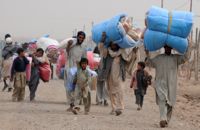Taliban Setting Up Human Shields

Thousands of civilians reaching Peshawar following military action in Khyber Agency say the Taliban have been preventing refugees from leaving. The refugees say local residents are being used as human shields.
Many members of about 55,000 families who fled the Khyber Agency when the operation against militants was intensified in March, say they faced severe difficulties reaching Peshawar, capital of the Khyber Pakhtunkhwa province of Pakistan bordering Khyber Agency, which is one of the seven units of the Federally Administered Tribal Areas (FATA).
'For two months we tried to leave our home but each time we were stopped by Taliban,' Rehan Gul of Aka Khel locality in Bara in the Khyber Agency tells IPS.
Gul, 49, a farmer, who reached Jallozai camp near Peshawar Apr. 24 along with his wife and seven children, says the Taliban had held hundreds of families hostage to shield them against government action. 'All the people wanted to move to safer places and escape war between the army and the Taliban, but the Taliban would not give them safe passage.'
The military offensive against Taliban militants in FATA areas has put the lives of the tribesmen on razor’s edge. The internally displaced persons (IDPs) presently staying in refugee camps or with relatives in Peshawar and elsewhere in the province say that hundreds of men, women and children are still waiting in their homes to be evacuated to safer places.
'It is now an established strategy of Taliban that they do not allow people to go to Peshawar so as to use them as human shields and protect themselves against ferocious action,' police officer Arshad Khan tells IPS.
'With the complete breakdown of facilities such as electricity, water, education and non-availability of edible items due to battles and curfew, there is no point in staying there,' Zameer Shah, a resident of Usmanabad town in the area tells IPS. 'We came out Mar. 28 and told Taliban that we are shifting our sick mother to Peshawar, and they allowed us.'
'We came out in the darkness of night and reached here after getting past the Taliban at two places on the way,' says Rashid Khan of Ghareebabad village. 'We told Taliban members that my sister has temperature and she would die if not rushed to hospital.' He says there are few facilities in Jalozai refugee camp but at least they were safe.
KP Information Minister Mian Iftikhar Hussain says the Taliban have used such methods widely. 'They have applied these tactics in Waziristan, Bajaur, Kurram agencies in FATA and Malakand division in Khyber Pakhtunkhwa to escape military operation,' he tells IPS.
Insurgency has hit the tribal population so hard that a quarter of the 12 million population of FATA have permanently left their hometowns, says Hussain.
'On Mar. 12, we got into a vehicle to get to Peshawar but the Taliban stopped us and forced us to get back to our home,' says Ghafoor Ali. 'The next day, we started walking on foot and reached here after 13 hours.' Father of five, Ghafoor Ali says this was hard for his wife and children, 'but there was no option.'
Pakistan’s lawless FATA on the Afghan border is home to Al-Qaeda and members of the Taliban since the dismissal of their government in Kabul towards the end of 2001 when the U.S. launched an offensive against them.
In 2005, the Pakistan government launched military operations in most of the FATA region that is spread over 47,000 sq km after the Taliban started targeting government buildings, police and the army.
In many troubled areas such Orakzai, Khyber and South Waziristan, the military is facing hardship in beginning full-scale action because of the presence of civilians, says Muhammad Jamil, based in Mardan town in the area. The Taliban have been using the trapped population in areas where military operation is in progress to their advantage, he says.
'The Taliban have warned people through announcements on loudspeakers not to leave the area. They have also warned of dire consequences for families leaving the area,' says Musafar Waheed from Mohmand agency.
The UNCHR has registered 687,550 displaced people from FATA. The UNHCR says about 30,000 civilians fleeing the conflict-riddled Khyber Agency are being registered every day. The government has established five camps for displaced persons in collaboration with UNHCR.
'There is no sign that the military operations in tribal areas would end in the near future. The raging militancy is spreading to areas that were previously calm,' FATA official Umar Farooq tells IPS. Farooq says displacement of people continues due to military action against Taliban.
'The government is now launching an operation against militants in North Waziristan but we are not prepared to accommodate the displaced people from there,' Farooq says.
The military operations launched in 2005 have failed to bring peace, he says, and instead, militancy is increasing. 'Military action is no solution. These have only added to the problems of the residents of FATA, who are running from pillar to post to find shelter.'
© Inter Press Service (2012) — All Rights Reserved. Original source: Inter Press Service

